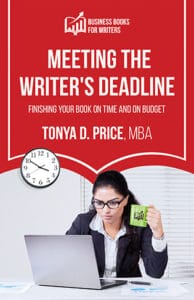The middle of your novel is a dangerous point
When I started my indie publishing business I gave myself three years to break even because when I created my business plan I determined I had enough to cover my bills for three years. That was a mistake. Yes, I knew I needed to be patient, but I thought I was smart, I had started two successful companies, I was a fast learner, I could at least break even by year three.
I’m two months into my third year and I was right. I will run through the money I had saved to be a full-time writer at the end of this year.
That artificial deadline put pressure on me once year two finished! I have a backup plan and I didn’t waste my cash on non-productive expenses. I invested in tools with lifetime subscriptions that will be useful as I move forward. That doesn’t lower the temptation to quit.
I am currently working on a Young Adult Historical Novel. I consider myself a thriller writer, but I love to write short stories and while my novels have been thrillers, my short stories often are about teenagers in historical settings. My husband says this is because I never grew up. He may be right or at least right that I find it easy to slip back into my teenage view of the world. A young adult historical novel was not in my business plan. I am writing this novel though because I believe this novel has something important to say to middle and high school students about a time they know little about and social issues they face today.
I have reached 39,ooo words out of a projected 80,000 words. That means I’m closing in on the dreaded middle of the novel. I say dreaded because I, like so many authors find that when I hit the middle of the story, whether I’m working on a short story or a novel, I begin to doubt the project. There are so many reasons not to write this book. I’m not a young adult writer. This book wasn’t in my business plan. Having written four books and over a hundred short stories I know this is normal and to keep writing, but many writers talk themselves into quitting at this point.
Most writers tell me they have experienced the same thing. Before you write a novel, you have this fantastic idea. As you do your research, the story takes form. You can start to see the twists and turns in the plot. Your characters start to become real people with flaws, strengths, dreams, and obstacles. In the middle of the night, your subconscious wakes you up with more ideas. You begin to hear dialog in your head at the oddest moments like in the shower, or on a bike ride or sitting listening to your husband tell you about his day.
Then you start writing. Finally, you can get all these ideas on paper, and you have started writing the novel. The excitement of working on a new book means sometimes it is hard to fall asleep. You get your word count up and then, you realize you are starting to run out of steam. Your world is laid out. Your characters have been established. Act one is over, and you are halfway through act two, and you begin to wonder if this great idea was really an illusion. Everything seems predetermined. Those twists seem too obvious. Things are getting worse. Is the main character in any danger? Where did your voice go? Are you still integrating the five senses into the scenes?
You think maybe this is a waste of time. Perhaps you should switch to another story idea. The book is not as good as you thought this novel would be and frankly, sitting down to write every day is becoming a chore. Entrepreneurs often find themselves in the same situation when they start a new business. Writers and entrepreneurs both share these doubts.
Writers and entrepreneurs follow similar challenges.
I have observed that the third year after you start writing full-time is also a dangerous time for a writing entrepreneur. Full-time writers start out with an idea to create a writing company. You created your vision of what you wanted to do. You knew the type of writer you wanted to be. You knew what kind of writing you wanted to do. You knew the type of reader who would love your work. You might even have had several completed novels that just needed to be sent to a copy editor and proofreader or out to a traditional editor.
Starting a company is every bit as exciting as starting a novel. You need to set up a bank account. You need to get a domain name and a website. You have the time to start following your favorite author blogs and a marketing blog and a business blog. You have time to listen to podcasts from other writers and entrepreneurs and if you are indie publishing you need to pull together your production team: your copy editor and proofreader and graphic designer and interior book designer.
You spend time figuring out how to balance the different aspects of your writing business: handling the administrative duties, the management duties and of course, the creative aspects of your business.
Year one you established your business. Year two you begin to see some success, albeit the revenues are enough to buy a cup of coffee each month. You connect with your twitter followers and start to make real connections with other full-time writers. You take classes, and you learn so much you feel like you have earned a masters in writing entrepreneurship by the close of the second year. (Writers and entrepreneurs who do not do things start out at a disadvantage.)
Then comes year three and it hits you that this process is going to take much longer than you thought. All those obstacles that you felt confident you could conquer now loom larger. You know writers aren’t competing against each other, but some of your new acquaintances are starting to have more success than you. You worry about what you will do if it turns out you weren’t as smart as you thought. Maybe, you think, you aren’t as good as your mentors said you were at writing.
Your bank account is shrinking and just watching the money dwindle down makes you doubt the wisdom of your decision to go full-time.
Some writers and entrepreneurs quit at this point.
Don’t you dare!
Just like when you get to the middle of your book, and you feel like you should scrap your plot and write this other great idea you have, you need to stay the course.
When you get to the middle of your novel you have to keep writing. It is hard to do so, but this is the point that you go forward on blind faith. Use whatever means you need to, but keep writing. Maybe you tell yourself that you are just writing the first draft and it is okay if the plot is stupid. This is a working copy, and if the book still seems to have problems when you finish the last chapter, then you can write a different book and let this one ferment for a while. It may turn out to be Lindbergh cheese, or the book might turn out to be an excellent brie, but you won’t know if you don’t keep writing.
Take the same approach with your business. Three years is not enough time to determine if you can be successful or not. Just keep working. Keep writing. Keep learning. Keep putting in full-time hours.
Successful writers and entrepreneurs know the middle is never as bad as you think when you reach it.
A strange thing happens when you write past that horrible, stinky middle of the novel. In a few thousand words, the plot begins to take off. All those story threads you’ve been laying out start to come together. Your character development becomes more apparent. Your antagonist comes into sharper view. Then you hit Act three, your protagonist is really in trouble and writing them into their final triumph is loads of fun.
You finish your first draft. No, it is not perfect, but it is good. Really good. Now, go back and read the entire draft. Guess what? The middle isn’t bad at all! In fact, the middle of the story works well. You included all that sensory detail you thought you forgot. You put down the character details you wanted to add. You set up the reader for the final run to the finish. The book is not exactly what you thought it would be before you started. In many ways, you realize the plot is better.
Aren’t you glad you didn’t quit writing and start another writing another unfinished book?
You will be when an editor buys the book, or when your income rises.
Remember the lesson of the middle of your book when think you think of giving up
Writers and entrepreneurs do best when they keep working and don’t quit. If you run out of money, take on a part-time job. Cut your expenses way down. Drop some services you can do without until your sales pick up, but do not quit. Follow M.L. Buchman’s advice: don’t spend money unless it saves a buck or makes you a buck.
If you keep working hard, you will succeed. When you do, you will look back and realize writing full-time was not like what you thought it would be when you wrote your business plan. Working as a full-time writer is much better and when you do break even and start covering your expenses with your sales, guess what? You will find what other writers and entrepreneurs have discovered: being a full-time writer is much more fun than you imagined.
Have trouble finishing your book? Meeting The Writer’s Deadline helps writers who struggle with completing their book projects.





Leave a Reply
We respect your privacy. Your email address will not be shared or sold.